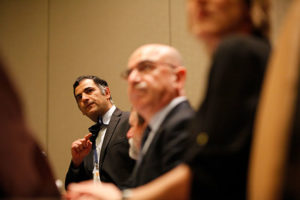
Mehdi Mirsaeidi, MD, describes desertification as part of climate change.
Scientific leaders agree there is climate change; political leaders do not. But speakers at Monday’s Global Perspectives on Climate Change: Impact on Susceptible Populations and Low-Income Countries said medical professionals have a responsibility to educate and protect patients against the health problems directly related to climate change. This should begin with calling out climate change in the clinical setting, said Mary B. Rice, MD, a pulmonologist at Beth Israel Deaconess Medical Center in Boston.
“Let’s begin calling climate change what it is. Let’s use those words,” said Dr. Rice. “When patients have conditions that are caused by climate change, we need to tell them and make it real for them. Let them know this isn’t pseudoscience.”
Monday’s session served as a call to action with Dr. Rice, co-chair of the event, saying physicians can get involved in climate control policy and advocacy, and even question energy use at their own facilities, but she urged them to step up and play a role in changing the dialogue about climate change.
“Talking about ice caps and polar bears is not going to win people over,” Dr. Rice said. “No one can relate to polar bears.”
People are paying attention to climate change even if government is not, said Waleed Abdalati, PhD, director of the Cooperative Institute for Research in Environmental Sciences (CIRES) at the University of Colorado in Boulder, who could not make it to Dallas due to bad weather. Session co-chair John R. Balmes, MD, ATSF, director, professor of environmental health science at the University of California in Berkeley, delivered Dr. Abdalati’s remarks.
Our military, farmers, the insurance industry, and the real estate industry are all keeping an eye on climate change and its direct impact on their industries, Dr. Abdalati said. He pointed to China, Europe, India, and North America as the countries that use the most energy and are the most responsible for contributing greenhouse gases to the air
“If we continue on the path we’re on, we’ll face extreme temperature rise if we don’t get our act together,” he said.
These extreme temperatures will contribute not only to heat stroke, but also respiratory disease and cardiac diseases. Fewer frost-free days and longer flowering times will increase allergies. Increased smog and ozone will trigger asthma and diminished lung capacity, he said.
“The human race is entering new territory, and it is territory that will come with consequences,” Dr. Abdalati said.
Presenter Muge Akpinar-Elci, MD, MPH, ATSF, professor at Old Dominion University in Norfolk, Virginia, has been speaking on climate change for 10 years, but found preparing for this presentation a stark contrast to what it was back then.
“This year, it was overwhelming because when I started this 10 years ago, there was not that much information, but now, there is overwhelming evidence of climate change,” Dr. Akpinar-Elci said. “It’s a survivor issue right now, no longer just something happening ‘somewhere.’”
The effect of climate change on allergies and chronic respiratory diseases isn’t just affecting low-income countries, but all of us, she said.
Desertification, the transformation of fertile land into desert, is another resulting element of climate change’s rising temperatures and longer droughts, and it will make the pulmonary conditions already exacerbated by existing air pollution even worse, said Mehdi Mirsaeidi, MD, assistant professor at the University of Miami.
“By 2025, it [desertification] could displace as many as 700 million people,” he said.
This prompted audience member Sharon Rounds, MD, professor of medicine at Brown Medical School in Providence, Rhode Island, to ask what pulmonologists could do to help patients mitigate the effects of rising temperatures and dealing with the dust from desertification.
“People at higher risk should reduce their exposure by staying indoors and wearing masks” on days when the elements are worse, said Dr. Mirsaeidi. “We need a network for alerting people about [high dust days], but we don’t have one.”
Some countries, due to location and economic situation, seem more susceptible to climate change, according to session co-chair Hasan Bayram, MD, PhD, ATSF, a professor at Koc University School of Medicine in Turkey. However, Kent Pinkerton, PhD, professor at the University of California, Davis, added that we all should be concerned.
“The developed world needs to be very concerned for the low- and mid-income countries, but we also need to be concerned [for ourselves],” Dr. Pinkerton said.
If temperatures continue to increase at two degrees Celsius, all coral reefs in the world will die. If we can cut that increase to 1.5 degrees Celsius, we’ll save 30 percent, he added.
“This is not meant to be a doom-and-gloom talk,” said Dr. Pinkerton, but climate change and its resulting effects are real and the sooner they are addressed, the bigger the positive impact, he said.
